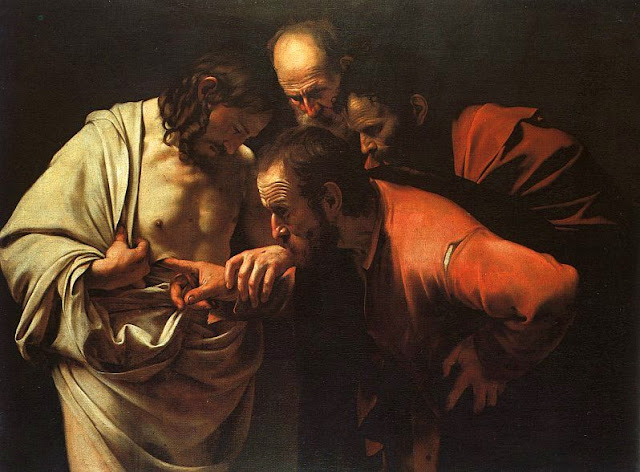SIXTH APPEARANCE OF JESUS
(Sunday, one week after the resurrection.)
JOHN 20:26-31
I. COR. 15:5
My Summary: Thomas was not with the other disciples when they saw Jesus among them. He commented that he would have to have physical proof to believe.
"But he said to them, “Unless I see in his hands the mark of the nails, and place my finger into the mark of the nails, and place my hand into his side, I will never believe.”" John 20:25
Jesus appears to the disciples a second time, eight days later. Again, John includes the detail that the door was shut:
"This shows that the Lord had now the spiritual body, soma pneumatikon, of 1Co_15:44."-Bullinger
Jon Courson views the initial absence of Thomas as evidence that he was straying and that the disciples and Christ drew him back in. I'm not sure what I think of this. In one way, I can see how his absence was notable--why was he initially missing? In another, I feel like that's a rather big conclusion.
"Then he said to Thomas, “Put your finger here, and see my hands; and put out your hand, and place it in my side. Do not disbelieve, but believe." Thomas answered and said unto him, My Lord and my God."” John 20:27-28
"We have here the first confession of Christ as God. It should be said in Thomas' favor that if his doubts were heaviest, his confession of faith was fullest. He had more doubts as to the resurrection because it meant more to him; it meant that Jesus was none other than God himself." -Fourfold
"In his Gospel, John has traced the development of unbelief, which culminated in Jesus’ enemies crucifying Him. Conversely, John also traced the disciples’ development of faith, which was now climaxed in Thomas." -BKC
 |
| The Incredulity of Saint Thomas by Caravaggio, c. 1602 |
"Thomas’ response, My Lord and My God! is the high point of the Gospel. Here was a skeptical man, confronted by the evidence of Jesus’ resurrection. He announced that Jesus, the Man of Galilee, is God manifest in the flesh. Thus the truths in the first chapter were realized personally in this apostle (Joh_1:1, Joh_1:14, Joh_1:18)."-BKC
Jesus said to him, “Have you believed because you have seen me? Blessed are those who have not seen and yet have believed.” John 20:29
"Jesus then pronounced a blessing on all who would come to faith without the help of a visible, bodily manifestation to them (Joh_20:29; cf. 1Pe_1:8). This blessing comes to all who believe on the basis of the proclaimed gospel and the evidences for its validity. Believers living today are not deprived by not seeing Him physically; instead, they are the recipients of His special blessing: Blessed are those who have not seen and yet have believed."-BKC
John explicitly states the purpose of his book:
"Now Jesus did many other signs in the presence of the disciples, which are not written in this book;
but these are written so that you may believe that Jesus is the Christ, the Son of God, and that by
believing you may have life in his name." John 20:30-31
"John explained His purpose in writing this Gospel, that people might contemplate and perceive the theological significance of Jesus’ miracles (sēmeia, “signs”). To ignore, deny, or rationalize them in that day was impossible because the miracles were manifold and manifest. John indicated He was aware of the Synoptic miracles: Jesus did many other miraculous signs. In fact, 35 different miracles are recorded in the four Gospels (see the list at Joh_2:1-11). John selected 7 for special consideration in order that people might come to believe that Jesus is the Christ, the promised Messiah, and the Son of God. (The NIV marg. reading, “may continue to believe,” is probably not the correct textual reading; the NIV text correctly renders the Gr. by the words may believe.)" -BKC
"But it is not merely in order to represent Jesus as the Christ of God that these things are written, but it is that that representation may become the object of our faith."-Alexander MacLaren
"Faith sees what the man who lacks faith never does. It's a whole different dimension and an entirely different perspective."-Jon Courson
"Have been or stand written. The perfect tense. John's intent was to write a gospel rather than a biography."-Vincent's Word Studies

No comments:
Post a Comment